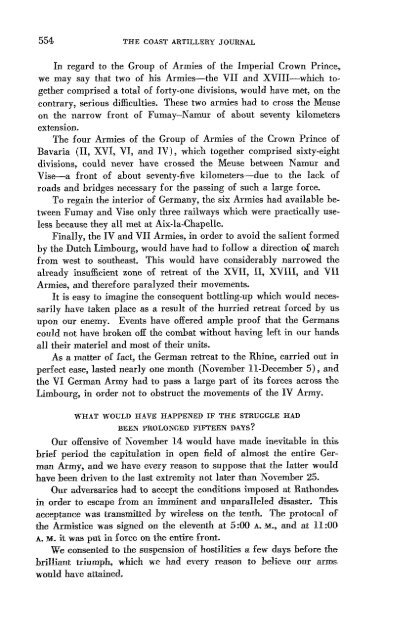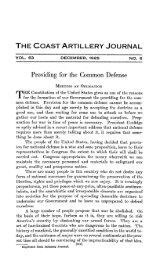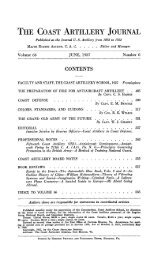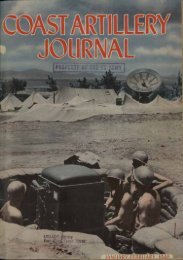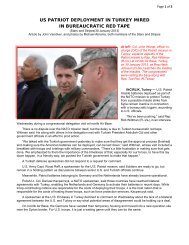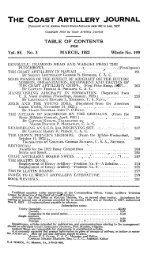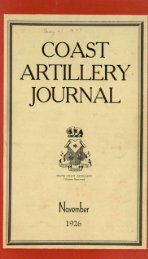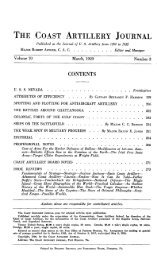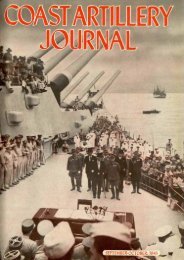COAST ARTILLERY, JOURNAL - Air Defense Artillery
COAST ARTILLERY, JOURNAL - Air Defense Artillery
COAST ARTILLERY, JOURNAL - Air Defense Artillery
You also want an ePaper? Increase the reach of your titles
YUMPU automatically turns print PDFs into web optimized ePapers that Google loves.
554 THE <strong>COAST</strong> <strong>ARTILLERY</strong> <strong>JOURNAL</strong><br />
In regard to the Group of Armies of the Imperial Crown Prince,<br />
we may say that two of his Armies-the VII and XVIII-which together<br />
comprised a total of forty-one divisions, would have met, on the<br />
contrary, serious difficulties. These two armies had to cross the Meuse<br />
on the narrow front of Fumay-Namur of about seventy kilometers<br />
extension.<br />
The four Armies of the Group of Armies of the Crown Prince of<br />
Bavaria (II, XVI, VI, and IV), which together comprised sixty-eight<br />
divisions, could never have crossed the Meuse between Namur and<br />
Vise-a front of about seventy-five kilometers-due to the lack of<br />
roads and bridges necessary for the passing of such a large force.<br />
To regain the interior of Germany, the six Armies had available between<br />
Fumay and Vise only three railways which were practically useless<br />
because they all met at Aix-Ia-Chapelle.<br />
Finally, the IV and VII Armies, in order to avoid the salient formed<br />
by the Dutch Limbourg, would have had to follow a direction of march<br />
from west to southeast. This would have considerably narrowed the<br />
already insufficient zone of retreat of the XVII, II, XVIII, and VII<br />
Armies, and therefore paralyzed their movements.<br />
It is easy to imagine the consequent bottling-up which would necessarily<br />
have taken place as a result of the hurried retreat forced by us<br />
upon our enemy. Events have offered ample proof that the Germans<br />
could not have broken off the combat without having left in our hands<br />
all their materiel and most of their units.<br />
As a matter of fact, the German retreat to the Rhine, carried out in<br />
perfect ease, lasted nearly one month (I\ovember II-December 5), and<br />
the VI German Army had to pass a large part of its forces across the<br />
Limbourg, in order not to obstruct the movements of the IV Army.<br />
WHAT WOULD HAVE HAPPENED IF THE STRUGGLE HAD<br />
BEEN PROLONGED FIFTEEN DAYS?<br />
Our offensive of 1\"ovember14 would have made inevitable in this.<br />
brief period the capitulation in open field of almost the entire German<br />
Army, and we have every reason to suppose that the latter would<br />
have been driven to the last extremity not later than ]\"O\-ember25.<br />
Our adversaries had to accept the conditions imposed at Rathondes.<br />
in order to escape from an imminent and unparalleled disaster. This<br />
acceptance was transmitted by wireless on the tenth. The protocal of<br />
the Armistice was signed on the eleventh at 5:00 A. M., and at 11:00<br />
A. M. it was put in force on the entire front.<br />
We consented to the suspension of hostilities a few days before the<br />
brilliant triumph, which we had every reason to believe our arms.<br />
would have attained.


